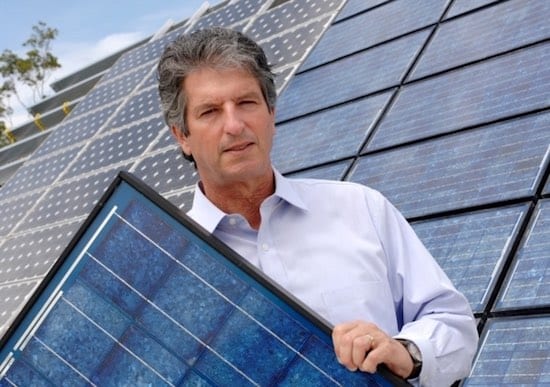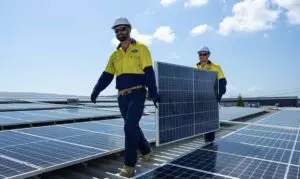Australia’s “father of PV,” UNSW Scientia Professor Martin Green, has been awarded the 2018 Global Energy Prize, beating out a shortlist that included Tesla’s Elon Musk, and becoming the first Australian to win the $820,000 gong.
The University of New South Wales said on Thursday that Professor Green had been selected from 44 contenders from 14 countries by a committee of leading scientists, to share the prize with Russian scientist Sergey Alekseenko, an expert in thermal power engineering.
Green was honoured, UNSW said, for revolutionising the efficiency and cost of solar photovoltaics and making it the lowest cost option for bulk electricity supply.
And rightly so – Professor Green, who is Director of the Australian Centre for Advanced Photovoltaics at UNSW, is a world-renowned as a leading specialist in both monocrystalline and polycrystalline silicon solar cells.
In 1989, his team supplied the solar cells for the first photovoltaic system with an energy conversion efficiency of 20 per cent. In 2014, he headed the development team that first demonstrated the conversion of sunlight into electricity with an efficiency of 40 per cent.
Professor Green also invented the PERC solar cell, which accounted for more than 24 per cent of the world’s silicon cell manufacturing capacity at the end of 2017.
On top of all that, the research group he founded at UNSW – the largest and best-known university-based PV research group in the world – is broadly credited with driving the enormous reductions in costs in solar PV, largely through the work of his students in establishing manufacturing centres in Asia.
“Not everyone would agree with that attribution,” said Green in an interview with RE on Friday – adding that Tesla’s Musk would have been his pick for the prize, for his crucial work of putting electric vehicles on the agenda.
And the Professor was keen to pay tribute to his UNSW solar stablemates, Zhengrong Shi, who left Australia to form Suntech Power in the US; and Stuart Wenham – the “Einstein” of the solar world, who died, aged just 60, in December last year.
“In particular, Stuart created this computer program that was a virtual production line,” Green told RE. “That overcame the language barrier in training hoards of Chinese engineers in setting up these (solar PV) production lines.”
Some 15 to 20 years later, and the global growth of solar PV – now the cheapest new form of energy generation – has soared beyond virtually all predictions.
“If you look at the figures from the last few years growth has consistently stayed at around 40 per cent a year,” Green said.
“If it keeps growing at that rate, we’re looking at hitting a terawatt of solar production in 2024.
“Even if it slows to growth of 20 per cent a year, we are on track to reach production levels of a TW a year in the late 2020s.
“And that’s the area where you can really start cutting greenhouse gases.”
And that’s what it’s all about – a cheap transition that does not cost more than business as usual, in fact will likely deliver savings – although some people, and some governments, prefer to remain none the wiser.
Which is why awards like this one are so important.
“I think (this is) a good opportunity to get across the message that things have changed with solar and that it’s the best option out there,” Green said.
“That’s an important message to get out.
“There’s a growing consensus that we’re going to get most of our energy out of solar down the track.
“It’s not a matter having to help solar along. It’s not about removing the last remaining barriers – and getting out of the way of (renewable energy),” he said.
Green said removing barriers often meant changing regulations to make them consistent with a solar type of future, as well as overcoming political resistance in places like Australia and the US.







